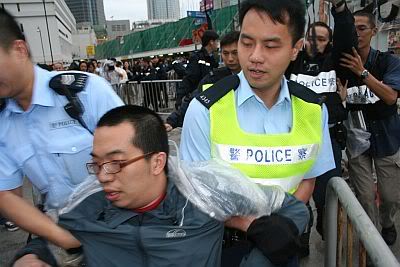
Chan King-fai, a post-’80s activist and critic, was a core member of Local Action who participated in the battle to conserve Star Ferry Pier and Queen’s Pier. During the campaign, Chan directly hindered construction work by occupying Queen’s Pier. He also went on hunger strike for 118 hours.
Chan strongly disagrees with those who see the conservation movements as a kind of affection for colonisation. Although Queen’s Pier witnessed the arrival of most British governors, Chan says “there was only one day for colonists to land on the piers, for the rest of the 364 days [the piers] were used by locals.”
Chan remembers meeting young people who worked in Central and took their lunch boxes to eat at the pier because they could not afford the expensive restaurants. He adds the piers were important public spaces where the elderly and homeless people spent their time.
Today, Chan is often criticised for being left wing and attacked as a “left plastic” whose adherence to “peaceful, rational” protest methods are a form of defeatism that has let Hongkongers down. He says conflict now permeates our society.
“We lose patience even with our own people [Hongkongers],” he says. He recalls that during the occupation of Queen’s Pier, workers who relied on the construction work to make a meagre living opposed their movement. Chan reasoned and tried to negotiate with the workers because “we should not make them our enemies,” he says.
To Chan, the core value of localism is to protect the oppressed classes, the residents in old districts and hawkers, and, overall, to promote a more equal society.
“I think this [life of the oppressed class] is actually the common life experience of the majority of Hong Kong people,” he says and he regrets the change of focus in localism which he thinks ignores the disadvantaged and their needs.
Unlike Chan, Chen Ho-lok, a former executive committee member of the Land Justice League activist group, says he did not have a concrete idea of what localism was when he took part in the anti high-speed rail movement when he was just 22.
“Actually I was influenced by a soprano in the choir who was often absent,” says Chen, who was also a member of the Chinese University of Hong Kong Chorus. After seeing her distributing leaflets against the high-speed railway, Chen decided to help her.
Chen says he used to feel detached from Hong Kong. “Every time I watched the fireworks display, I did not recognise Hong Kong as somewhere I was familiar with,” says Chen.
However, he established a connection to the city after the Satyagraha walk in 2010. It was a slow walk across five districts, from Sheung Shui to the Legislative Council building, to protest against the Guangzhou-Hong Kong high-speed rail link. It “awakened” Chen and established his connection to his city. He gave up on his idea of studying or working overseas in order to concentrate on helping to cultivate civil society in Hong Kong.
Looking back, Chen reflects that the movement was made up of a loose group of individuals. He remembers 10,000 people surrounded the Legislative Council building in Januarary 2010 after the legislature passed a HK$66.9 billion budget for the railway project.
A meeting was held afterwards to review the whole movement. The meeting of mainly post-’80s activists, descended into a disagreement between those on the right and left. Fellow travellers became enemies. One accusation was that protest leaders invited failure by continually de-escalating the protest when emotions were running high and that their methods were not militant enough.
“It broke many partnerships, made people disheartened and they could not collaborate with each other any more,” says Chen.
For Wong Wai-kwok, associate professor of the Department of Government and International Studies at Hong Kong Baptist University, this line of argument has become commonplace.
“People don’t discuss matters, they will ask whether you are a pan-democrat or if you will betray Hong Kong.” Wong says these kinds of discussion are almost personal attacks.
He believes there is neither a framework nor limits set for localism, which makes it an abstract concept to today’s youngsters.
“Students may not support certain ideologies of localism, as they are too abstract, but they will support political organisations such as Youngspiration and the Hong Kong National Party,” says Wong.
Wong observes that young people seem to place their hopes on political stars from the localist groups with little questioning. He notes that having invested their trust in them, some students “don’t dare to oppose these groups” even after seeing them attacking each other in this year’s Legislative Council election.
But while Wong sees changes in localism, Brian Fong Chi-hang, an associate professor of the Academy of Hong Kong Studies at the Education University of Hong Kong, sees a vital and unchanged element in localism – the uniqueness of Hong Kong identity. Fong cites the example of values such as liberty, the rule of law and integrity which distinguish Hong Kong from China.
“Hong Kong identity is always facing a mirror, which is China. All our values are relative to that of China. For instance we speak Cantonese while they speak Putonghua,” Fong says. He believes the term localism reflects, to a certain extent, the Hong Kong-Mainland segregation.
Fong sees the National People’s Congress Standing Committee announcement on August 31, 2014 which ended Hong Kong’s hopes for a free and open election of the Chief Executive as a landmark that showed that “Beijing’s power over Hong Kong is explicit, direct and violent to a certain extent … leading to the strongest rebound in the ideology of localism.”
Fong notes that Beijing’s policy on Hong Kong was relatively hands-off when Tung Chee-hwa, the first Chief Executive of Hong Kong was in office. This changed after the 2003 July protest and intervention has been more intense since 2014.
Localism is just a defensive response, Fong says. “Localism transforms into a backlash, a confrontational emotion against the Chinese government’s interference … People say Beijing has lost a generation of [Hong Kong] people, but I think she has lost generations.”
For more on how young people view localism, read the next story in this series Youth Pin their Hopes on Localism
Edited by Vivienne Tsang









































